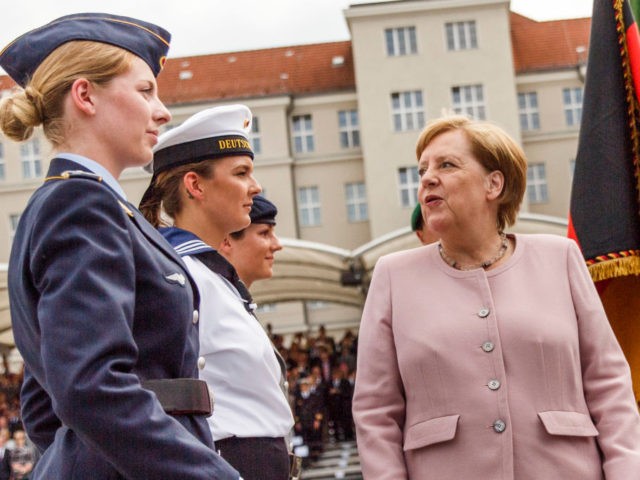UK Prime Minister Boris Johnson will receive full military honours when he arrives in Berlin Wednesday evening as he commences a week of talks with European leaders on what may be the final attempt to resurrect Theresa May’s widely derided withdrawal agreement.
The withdrawal deal dictated to the United Kingdom by the European Union was rejected three times by Parliament in early 2019, and the failure to push it through combined with the rise of Nigel Farage’s Brexit Party brought the end of Theresa May’s time as prime minister. But now Prime Minister Boris Johnson is apparently working to resurrect the deal, hoping to achieve minor modifications such as dispensing with the hated Irish backstop to get it through Parliament on the fourth attempt.
Delingpole: Removing the Backstop Isn’t Enough, Boris. We Demand Full, Unconditional Brexit! https://t.co/tqCer26tsl
— Breitbart London (@BreitbartLondon) August 20, 2019
With less than ten weeks to go until the “do or die” withdrawal date of October 31st promised by his government, Boris Johnson is now entering into talks with European leaders in the hope of achieving enough change to prevent a full, no-deal Brexit. Leaving without a deal is popular with leading Brexiteers who believe the withdrawal agreement as defined would lock the United Kingdom into the position of being a rule-taker from Brussels indefinitely, making a mockery of the spirit of the 2016 referendum, but the idea of leaving Europe altogether is abhorred by much of Parliament and the Civil Service.
Speaking to British television Sky News this week, Mr Johnson put forward his case for change, remarking: “Don’t forget why we’re doing all of this.
“The existing agreement just doesn’t work for the UK. And Parliament has thrown it out three times.
“We can’t have this backstop. So I’m going to go to see our friends and partners – I’m going off to Germany and then to France, and then to see the G7 at Biarritz, and I’m going to make the point that the backstop is going to come out.”
EU Rejects Boris Johnson’s Last-Ditch Appeal to Strike Brexit Deal https://t.co/TNH8LBxWVB
— Breitbart London (@BreitbartLondon) August 20, 2019
Perhaps the most promising signals from Europe have been from German Chancellor Angela Merkel herself, who will receive Boris Johnson in Berlin with military honours Wednesday night. Chancellor Merkel had said there was a potential for a “practical solution” to the Irish border issue, a roadblock which some Brexiteers claim has been deliberately exaggerated to slow or half the Brexit process altogether.
Merkel also implied other European leaders were willing to work on the issue, but stopped short of saying the Brexit deal itself could be renegotiated, a move which again pushes the United Kingdom towards a full, no-deal Brexit.
Others have been less obliging. Boris Johnson had an hour-long phone call with Irish Prime Minister Veo Varadkar this week in which he made clear there would be no renegotiation. European Council President Donald Tusk was equally unobliging, serving a three-sentence reply to Boris Johnson’s four-page letter setting out his aspirations for change to totally refute his ideas.
In the flat refusal, Mr Tusk accused Johnson of having no new ideas and even supporting a hard border in the island of Ireland, something the British government specifically opposes, and has recently said it would not do. The European Commission backed up this view, however, saying in a statement of Mr Johnson that he had not found a “legal, operational solution” to the issue.
Poll: Most Britons Prefer a No-Deal Brexit over a Prime Minister Corbyn and Second Referendum https://t.co/CACOl5XZhf
— Breitbart London (@BreitbartLondon) August 17, 2019
The European Union’s Brexit coordinator Guy Verhofstadt also poured cold water on the idea of renegotiation, as he had many times before, writing Tuesday that “I don’t see any majority in the [European Parliament] to remove the backstop from the Withdrawal Agreement. It is a vital insurance policy, negotiated in good faith & supported by the people of the Island of Ireland. The time for bluster & political blame games is fast running out.”
Despite the clear disinterest in renegotiations on the side of Europe, Mr Johnson nevertheless promised to engage in talks with enthusiasm, saying he would go in “with a lot of oomph”.
The military honours to be accorded to Mr Johnson Wednesday follow another military parade in Berlin that took place last week, which caught headlines for the curious spectacle of a torchlit parade made by soldiers wearing the distinctive stalhelm steel helmets often associated with the armed forces of the Third Reich. The parade was given in honour of outgoing defence minister Ursula von der Leyen, the controversial German politician going on to replace Jean-Claude Juncker as the president of the European Commission.
Oliver JJ Lane is the editor of Breitbart London — Follow him on Twitter and Facebook

COMMENTS
Please let us know if you're having issues with commenting.